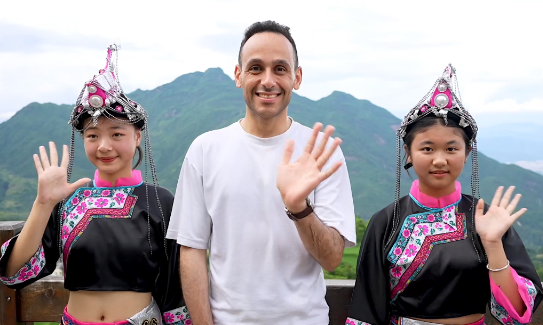TCM readily winning acceptance overseas
Use of artemisinin
Guangzhou University of Chinese Medicine, in Guangdong province, has been intensifying international TCM cooperation in recent years with counterparts in countries such as Cambodia, Malawi and Papua New Guinea.
In the island country of Comoros, off Africa's east coast, the incidence of malaria has been reduced by more than 98 percent since 2007, when Chinese experts from the university started to treat patients there using a TCM and artemisinin combination therapy, said Deng Changsheng, a researcher at the university's Artemisinin Research Center.
Artemisinin was discovered in 1972 by Tu Youyou, a Chinese pharmaceutical chemist who was co-recipient of the 2015 Nobel Prize in physiology or medicine after deriving it from sweet wormwood.
"Comoros used to report more than 100,000 malaria cases a year, but the number has been reduced to as low as 1,400 after the implementation of a program to fight the disease using artemisinin-based drugs guided by TCM principles," he said.
In addition to introducing TCM, researchers from the university are also working with some African countries to develop traditional African medicines, Deng said.
"Many countries, including African nations, also have their own traditional medicines, but research and development on them is lacking," he said. "We hope we can intensify cooperation in this area so traditional medicine brings more benefits."
Living and working conditions in some African countries are harsher than in Guangzhou, and Deng and his Chinese colleagues have gotten used to eating food with their bare hands instead of chopsticks when visiting rural areas, an adaptation that he said had benefits.
"Following local customs can help narrow the psychological distance between us and local people and increase mutual trust, which also helps them accept TCM more readily," he said.
TCM played an important role in fighting the COVID-19 pandemic in China, with many patients recovering after treatment combining TCM and modern medicine. It also is being used against the pandemic overseas. Of all confirmed COVID-19 cases on the Chinese mainland, 92 percent received TCM treatment. In Hubei province, the area hit hardest by the pandemic in China, more than 90 percent of all COVID-19 patients who received TCM treatments saw their condition improve, the National Administration of Traditional Chinese Medicine said.
In Mandalay, Myanmar, the China-Myanmar TCM Center has promoted cooperation in traditional medicines since its establishment in 2018, including TCM training and services, and scientific research into traditional medicine in Myanmar. The center was established by Yunnan University of Chinese Medicine, Myanmar's health ministry and the University of Traditional Medicine in Myanmar.
As cooperation and exchanges between the two countries in traditional medicine have intensified, TCM therapies, including acupuncture, have been allowed in some hospitals in Myanmar, and local people are more aware of TCM, the Yunnan university's officials said.
TCM is also becoming more popular in other Southeast Asian countries, and more medical students and professionals from countries such as Thailand, Laos and Vietnam are being trained in TCM at the university in Kunming, Yunnan's capital, it said.
Though the TCM center in Mandalay has been seriously affected by the pandemic, cooperation is still underway. The Yunnan university said it donated TCM drugs to the University of Traditional Medicine in Myanmar in April after a request from them, and more cooperation is expected.
-
Foreign teacher, Hangzhou students capture picturesque countryside
August 9, 2023
-
Hangzhou Asian Games launch 50-day-to-go campaign
August 4, 2023
-
Hangzhou achieves 6.9% GDP growth in H1 2023
July 27, 2023



